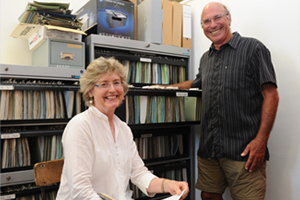Life-saving information at the touch of a button, thanks to alumnus
17 March 2014
The call to Dr Kate Balme on the Poison Information Centre's (PIC) national line is urgent. Three days into treatment for accidental ingestion of high levels of paracetamol, a young patient's liver has developed toxic damage.
Based at the Red Cross War Memorial Children's Hospital, Balme has been advising the patient's medical team, based at a hospital in Port Elizabeth, by tapping into AfriTox, a vast database of over 40 000 records on toxins collected and researched at the PIC over 30 years, and now the country's most comprehensive poison databank.
The call is one of 13 to 15 queries the poison team fields daily (after-hours calls are taken by the emergency paediatrics staff at the hospital).
In the past, this patient information would have been captured using a pencil, notebook and calculator, and then loaded onto the system. But this has changed, thanks to retired medical alumnus Dr Selig Leyser, who - during a brief holiday to South Africa from the US - designed a new program to record telephonic information and generate reports in real time, providing immediate statistics.
The collaboration resulted from an "extraordinary bit of luck" after a chance meeting at a UCT reunion at the end of November 2013, says PIC director Dr Clare Roberts.
Leyser was in Cape Town for the 40th reunion of his MBChB class. He'd trained in pathology in the US, and later developed an interest in systematic reporting of pathology specimens. He went on to design programs for the real-time recording of information that parents of patients gave to paediatric nurses by telephone.
At the reunion Leyser met Dr Mike Madden, Roberts' husband, who realised a similar program could be useful to the PIC. Leyser was keen to use his expertise to benefit people in the country in which he'd received his medical training. After visiting the PIC, he designed and perfected a program to record information from callers to the PIC, real-time, on a laptop. This analyses the data and instantly stores it on the dataset.
"In Africa, only we and the team at Tygerberg record this type of information systematically," says Roberts. "Now we will have our data from Red Cross at our fingertips, instantly, at all times, and can use it for a variety of publications and preventative purposes."
Leyser, who left South Africa in 1976, expressed a sentiment common among UCT alumni working and living abroad: "People connected to Africa want to contribute. There are many more medical alumni in the US who would like to contribute skills and knowledge, but current legislation prevents them from doing so."
Leyser paid for a part of the program that needed a commercial licence, and covered the costs of converting it from the Apple operating system to Windows.
"It's a Rolls Royce program," says Roberts proudly.
It's a far cry from the old card-index-and-textbooks system that medical personnel used to answer calls when the service first began in 1971. In 1981, work began on the national poisons information system, now AfriTox, to make all the information necessary for treating a poisoning case accessible on a computer.
The service is essential. For example, in the Western Cape, paraffin remains the biggest problem, particularly in Khayelitsha where it is often used for lighting and cooking; dealers buy it in bulk and decant it into plastic cooldrink bottles, which children mistake for soft drinks. In areas like Mitchells Plain, medicines top the list of substances accidentally ingested. Pesticide poisoning is also on the increase, Roberts notes.
"Dangerous substances meant for agricultural use only are being sold illegally on the streets for use as rat poison in the home. This puts adventurous toddlers at serious risk of poisoning."
Story by Helen Swingler.
 This work is licensed under a Creative Commons Attribution-NoDerivatives 4.0 International License.
This work is licensed under a Creative Commons Attribution-NoDerivatives 4.0 International License.
Please view the republishing articles page for more information.










